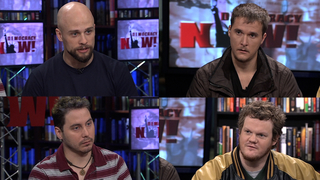
NATO helicopters and fighter jets attacked two remote Pakistani military outposts on Saturday, killing at least 24 Pakistani soldiers. The air strike took place along the Afghanistan border in Pakistan’s tribal district of Mohmand. Pakistan has said the attack was unprovoked, but a senior Kabul-based Western official claims NATO and Afghan forces came under fire and responded in self-defense. Pakistan responded Saturday by blocking vital supply routes for U.S.-led troops in Afghanistan and demanded the United States vacate a base used to launch drone attacks. We speak with Glenn Greenwald, constitutional law attorney and political and legal blogger for Salon.com. “We may never know what happened here for certain… But what is clear is that the endless war that the United States has been engaged in since 9/11 doesn’t seem to be in sight of ending. Quite the contrary, it seems to be escalating by the week almost,” Greenwald says. [includes rush transcript]
Transcript
AMY GOODMAN: On Sunday, Pakistan’s powerful army chief, General Ashfaq Parvez Kayani, led mourners in prayer at the official funeral for 24 soldiers killed in NATO attacks the day before. The air strike took place late Saturday night at two remote posts along the Afghanistan border in Pakistan’s tribal district of Mohmand. Pakistan has said the attack was unprovoked, but a senior Kabul-based Western official claims NATO and Afghan forces came under fire and responded in self-defense. Pakistan responded Saturday by blocking vital supply routes for U.S.-led troops in Afghanistan and demanded that Washington vacate a base used by American drones.
Speaking at a rally near Multan in the province of Punjab, Pakistani cricketer-turned-politician Imran Khan told thousands that Pakistan should stop fighting a war that is not theirs.
IMRAN KHAN: [translated] Every day, our soldiers and our citizens die. And they, the ones for whom they sacrificed their lives, attacked and killed our 24 troops. Today I condemn it in the strongest words, and I tell the Pakistani government that the time has come. You should pull out from America’s war.
AMY GOODMAN: In a statement, Defense Secretary Leon Panetta and Secretary of State Hillary Clinton expressed their, quote, “deepest condolences for the loss of life.” Both secretaries reached out to their Pakistani counterparts, as the U.S. worked to diffuse tensions over the weekend.
To talk more about the wider implications of this incident, we’re joined now by Glenn Greenwald, constitutional law attorney and political and legal blogger for Salon.com.
Glenn, welcome to Democracy Now! Talk about the significance of the NATO forces killing 24 troops, at least.
GLENN GREENWALD: It’s obviously extremely dangerous, in several different ways. There’s been anti-American sentiment spreading throughout Pakistan for many years now as a result of the continuous drone attacks that kill civilians and children. But what this is really doing is it’s forcing the political class in Pakistan to express this anti-American sentiment and to demand action based on it in ways that were never true before. I mean, imagine if a foreign country flew over to the United States and, from the air, killed 25 or 30 American soldiers on American soil. Every politician in the United States would be forced to engage in extremely hostile rhetoric against that country, and even probably take war action against it.
And the other danger is that the war in Afghanistan is very likely to spin out of control and become an all-out war with Pakistan. I mean, we’ve seen little incidents over the past few years, border skirmishes and the like, where we’ve killed a couple Pakistani troops. But to kill two dozen this way, at a time when U.S.-Pakistani relations have been more hostile than ever, is an extremely volatile and dangerous situation.
AMY GOODMAN: Now, some sources are saying that—not to Democracy Now!, but are being quoted in the rest of the media—that it was Pakistan troops that opened fire on NATO first, and NATO was responding.
GLENN GREENWALD: Well, here’s the problem, is, you know, these wars—there’s no formal war in Pakistan. There’s never been a debate about whether we should be engaged in military action in Pakistan. The drone program, which is the crux of what we do in Pakistan, is in fact so secret that officials in the government won’t even confirm that it exists, even though everybody knows that it does. And so, all of this is shrouded in secrecy. We’ll probably never learn what has happened.
The U.S. government routinely claims, when it kills civilians, or in this case, Pakistani troops, that either it was because they chased insurgents who used civilians as a shield or that the civilians themselves engaged in hostility. And many times, that proves to be completely false. The U.S. government and military have been caught lying so many times about what has happened. At the same time, the Pakistani government and the Pakistani military, there are elements within it that are hostile to the U.S. presence in Afghanistan, and they don’t exactly—they’re not exactly paragons of truth, either. But this is exactly how conflicts spin out of control, is by both sides making claims about who was at fault.
For the U.S. to claim that this was self-defense, meaning that we actually—that Pakistani troops shot at American forces first and then American forces returned fire, almost seems like it’s even worse. I mean, that’s describing a full-on war between Pakistan and the United States. And so, we may never know what happened here for certain. That’s part of the problem, because it’s all shrouded in secrecy and the fog of war and the like. But what is clear is that the endless war that the United States has been engaged in since 9/11 doesn’t seem to be in sight of ending. Quite the contrary, it seems to be escalating by the week almost.












Media Options